Colorful, sunny, dreamy Spain, with its beautiful beaches, a magnet for visitors from all over the world, is increasingly appealing for sunshine and new lifestyle seekers looking to relocate on a permanent basis.
If you’re unsure which locations are right for you, we’re here to help.
Take a look at our latest update on the hottest locations in this beautiful country.
Top places to live in Spain:
- Madrid
- Barcelona
- Valencia
- Seville
- Bilbao and San Sebastian
- Granada
- Malaga
- Marbella
- Sotogrande
- Estepona
- Alicante
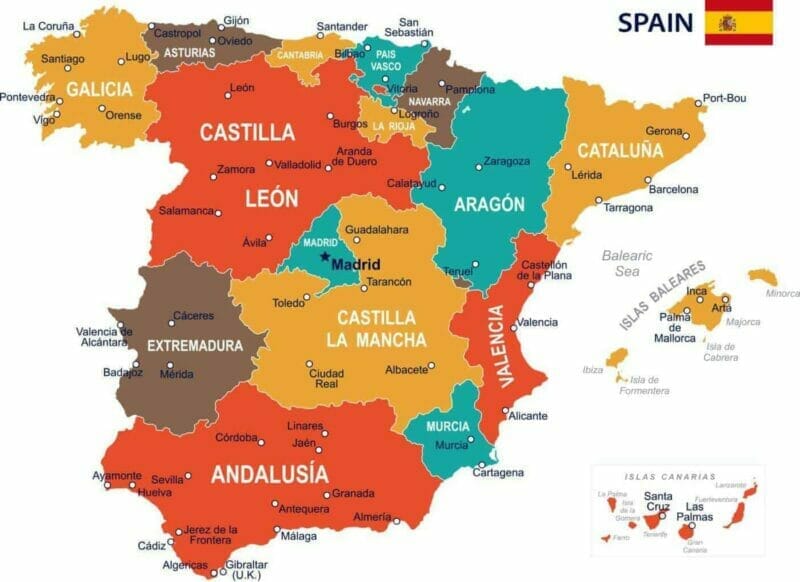
1. Madrid
Madrid is officially the third sunniest European capital after Malta’s Valetta and Portugal’s Lisbon. For many sun-starved northern Europeans, this fact alone makes Madrid an utterly desirable location.
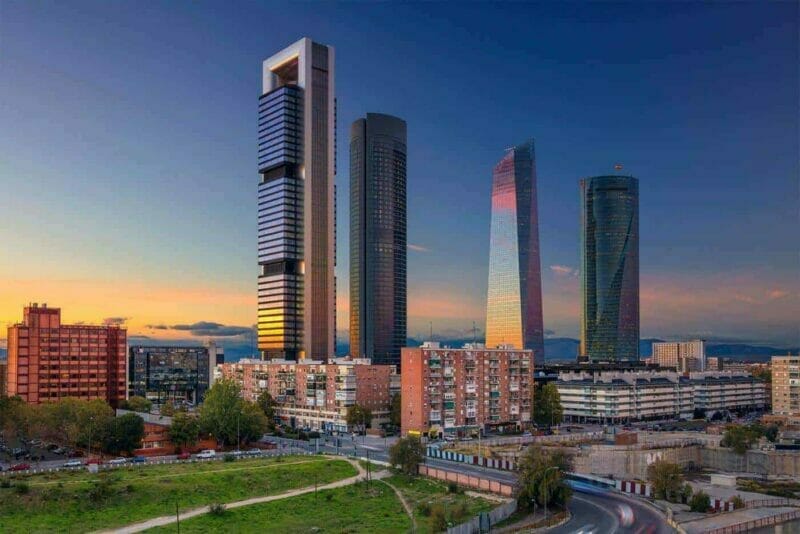
However, it’s not just northerners that hold Spain’s capital in high esteem. Madrid is loved internationally.
Thousands of expats from all over the world flock to Madrid every year. It has a healthy job market and is offering some of the most attractive employment opportunities.
The expat community in Madrid is huge and constantly renewing itself.
They say the longer you stay in Madrid, the more difficult it becomes to leave. The charms of Madrid are subtle and take time to work their way into your heart.
You will be amazed by its infinite cultural riches and authenticity, extravagant carnivals, exciting nightlife, and an abundance of fantastic places to eat out.
Madrid has three of the country’s most famous art museums, and two of them – the Reina Sofia and the Prado – offer free entry every night of the week.
Madrid comes alive after midnight when Gran Via becomes one huge traffic jam, enjoying its busiest hours through the night until morning when it reverts to calm.
It’s also a great location for families and those who love the idea of an active urban retirement.
Some family-friendly locations are very close to the center but far enough to be comparatively peaceful at night. Salamanca – a premium area near Madrid’s center, can be considered exceptionally tranquil by any capital city standard.
There are schools and walking paths, and it’s in close proximity to Retiro Park.
Chambery and Retiro neighborhoods have the same feel as Salamanca – very upmarket, close to the center, and relatively private and quiet.
Those are quintessentially urban neighborhoods with easy access to all the necessary services and amenities.
Properties tend to have more limited space and storage and no private gardens whatsoever. For a more residential feel and space, you need to move further away from the center.
Or, if money isn’t an issue, one option is to spend a small fortune renting or buying a villa in El Viso – the only urban area of Madrid close to the center that features houses and villas instead of the usual apartments.
Madrid’s system of public transport is excellent. So, moving away from the center won’t feel like such a big sacrifice, even for the most devoted urban dwellers.
Most residential neighborhoods away from the center and outside the city are very well-connected and easily accessible.
Madrid is not just the capital; it’s the country’s geographic center. This fact is officially confirmed by a plaque in the Puerta del Sol plaza, which is called the Kilometre Zero. Step on this plaque, and you are in the exact center of Spain.
The benefit of a central location is that it presents the opportunity for fantastic days out to explore the rest of the country using the high-speed AVE train.
Of course, life in a big city has its drawbacks. Our guide, ‘The Advantages And Disadvantages Of Living In Madrid‘ will help you understand Madrid’s pros and cons.
2. Barcelona
Barcelona is an eternal rival of Madrid; often, when one speaks of either of them, it’s in the context of comparison.

If you can’t make up your mind whether you’re a Madrid or a Barcelona kind of person, you should visit and spend some time in both.
The high-speed AVE train between the two cities makes the journey relatively quick and easy.
Unlike Madrid’s slow charms, Barcelona’s unique magic arrives at speed – one week is often all that is required to find yourself totally in love with the city.
For this reason, it’s also very touristy. If you come here once as a tourist, you won’t be able to resist coming back.
Barcelona’s unrivaled architecture is the reason people travel here from all over the world. It has most of Gaudi’s famous modernist buildings: the fascinating Sagrada Família, and the truly outstanding Park Guell among them.
Do you want an urban lifestyle and a beach? Then you need a coast, and that’s one thing that Barcelona has, and Madrid doesn’t.
Barcelona has its own beaches plus there are enough great beaches nearby (such as in Sitges) to make Barcelona a great city to live in for coast and beach lovers.
Barcelona’s climate is also rather wonderful. It is close to the Mediterranean, meaning slightly cooler summers than in Madrid but milder winters.
Just like Madrid, Barcelona boasts some fantastic festivals.
It has both the Primavera Sound and Sonar music festivals and the neighborhood celebrations of Gracia and Merce.
Finding work here isn’t as easy as in Madrid.
Salaries tend to be a bit lower, and speaking a reasonable level of Spanish is pretty much a requirement, but the work-life balance is great!
It’s worth remembering that this is the capital city of Catalonia, an autonomous region with its own official language, Catalan.
Of course, Castilian (Spanish) is spoken widely in Barcelona, but if you really want to hit it off with Catalans, try to pick up their language, or at least add a few well-placed phrases when you can – it will be much appreciated.
You can find more information in our Living In Barcelona Guide.
3. Valencia
Valencians never participate in the Madrid vs Barcelona debates. For them, it’s pointless, for everyone knows Valencia is one of the best cities in the world, obviously!
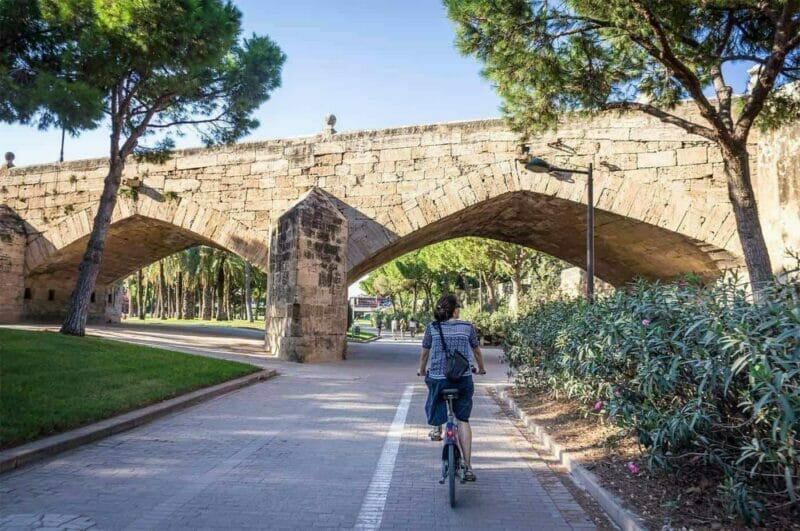
Valencia, Spain’s eastern province, is an urban hub for those living in Costa Blanca.
It’s large and loud, vibrant and dynamic, and has excellent infrastructure, facilities, cultural events, entertainment, and fabulous nightlife.
Valencia has been growing in popularity with expats and digital nomads for good reasons!
They say the quality of life there is simply great. Valencia offers plenty of sunshine, a great community, and affordability. It is also slightly offbeat and not overrun by too many tourists.
In short, Valencia is hot, fun, on the coast, and most of all, you get a lot more value for money compared to Madrid or Barcelona.
People are extremely friendly and welcoming. It’s all about life outdoors, with every resident, no matter how young or old, enjoying socializing every night of the week.
Days out can’t get better if you live in Valencia. The proximity to the most stunning mountains means you can go for long mountain hikes in summer and enjoy snowboarding or skiing in winter.
Valencia offers stunning Mediterranean beaches just South and North of the city if you want to enjoy a beach lifestyle.
The closest Las Arenas beach is just a short journey from the center.
Valencia is quite compact. Most places are within walking distance, and public transportation is great with a large underground rail network, which is constantly being expanded.
Valencia’s great for families. It has world-famous museums, such as the City of Arts and Science, adequate schools, an array of activities, and one of the best universities in the country.
For more useful insights, read our Living In Valencia As An Expat guide: the pros and cons, the best spots, the costs, property matters, etc.
4. Seville
Seville is Andalusia’s official capital.
The city is as picturesque as it gets: the Moorish architecture, the riverfront, the horse-drawn carriages… Seville is bright, hot, and vibrant.

It has a major airport, train station, and other transportation options, and two bus depots that make it easy to travel from Seville to destinations all over the country.
Despite its significance, Seville retains its small-town feel: safe and cozy. Indeed, if safety is your concern, Seville is the safest city in the country.
Residing in Seville means you’ll be close to the beaches and mountains. It will take you just one hour to get to the beaches in Huelva and the mountains in the Sierra Norte or Cádiz.
It’s also not far from the Portuguese border, so if you fancy spending some time exploring Portugal, Seville is ideally located.
Seville has received the title of the most bike-friendly city, thanks to its flat terrain and over 100 kilometers of bike lanes.
There are plenty of flamenco shows, music festivals, and gastronomic markets throughout the year.
Education options are brilliant, with German, American, and English schools in the vicinity.
However, if you want to be near the English school, it will mean moving to one of the villages in the Aljarafi area, outside of Seville, close to Bollullos de la Mitación – home of the British School of Seville.
Central Seville can be a bit on the pricey side; you might also find no properties with pools available for rent or purchase. However, what you will have on your doorstep is the vibrant buzz of urban life.
You will be surrounded by bars and restaurants and be able to walk or bike absolutely everywhere, and you possibly won’t even need a car.
5. Bilbao
If you’re seeking an alternative urban lifestyle, go to Bilbao.
Bilbao has never been extremely popular with expats. However, the focus is shifting from traditional destinations to less familiar and more exotic places. Bilbao is a perfect example of this shift.
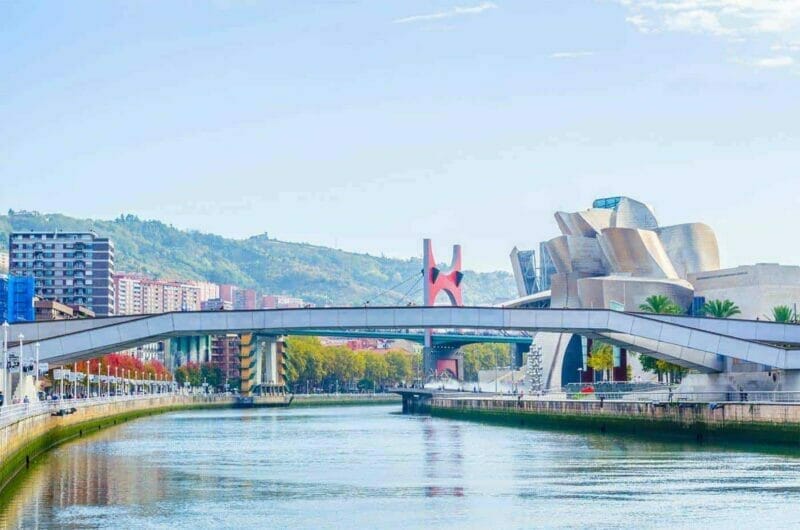
Bilbao is located on the less popular northern coastline overlooking the Atlantic Ocean and, therefore, cannot boast endless days of sunshine and a balmy climate like the Mediterranean locations.
On the plus side – there are considerably fewer tourists and expats here than in the south.
Bilbao, de facto, is the capital of the Basque country. Coming to Bilbao means exploring a different face of Spain, a different culture, another layer of the country’s great diversity.
Bilbao has seen its expat communities growing in numbers recently as more foreigners discover and appreciate more of what this beautiful country has to offer.
The Basque country is a wealthy region. It won’t be the first choice for expats seeking a cheaper lifestyle – Bilbao is the fifth most expensive location to live in Spain.
However, its lifestyle is superb, and once you sort out your accommodation and utility bills, day-to-day expenses aren’t so outrageous.
It’s great for professionals, families, and those who love the idea of an urban lifestyle in retirement but shy away from more frantic hubs such as Barcelona or Madrid.
Bilbao is a vibrant riverside city with a pronounced industrial past and an architecturally modern present.
Old factories and shipyards are found side by side with cutting-edge architectural designs, one of the examples being the titanium-clad Guggenheim Museum along a revitalized waterfront.
The old town is full of great bars and amazing food.
You will quickly get into a habit of walking along the 7 streets area of the city, hopping from bar to bar, sipping on Rioja or a beer, and feasting on pinchos (small bites to eat) – a Bilbao-style evening out.
The wine won’t disappoint you, either. The local region of Navarra has set up a growing industry in Rosé wine, which in Bilbao is 1€ a glass.
Bilbao might not be the biggest city, but what it’s big on is some serious rock music.
One way or another, big rock bands touring Europe end up having a gig in Bilbao. Radiohead, U2, Red Hot Chili Peppers, and Coldplay have all performed here recently.
You will find here the world’s biggest covered market with all kinds of produce – a paradise for gourmets of great food.
There are all kinds of shops in Bilbao, too, from typical high street shops, mainly along Gran Via, to modern shopping centers and high-end stores around Plaza Moyúa, to tiny boutiques and arty shops in the old town.
The Bilbao area is home to beautiful places and uncrowded first-class surfing beaches and is attractive to eager surfers worldwide. East of Bilbao is another popular town to consider – San Sebastián.
San Sebastián – one of the most attractive towns on the Cantabrian coast.
On the Basque Country coastline, San Sebastián is a haven for pleasure-seekers. If you are looking for relaxed coastal life, this is the right location for you.
You can idle your days away on Playa de la Concho, one of Europe’s most amazing urban beaches, and then explore chic boutiques in La Parte Vieja when you need a break from the sun.
The town has plenty of amazing bars where you can indulge in delicious Basque tapas as you hop from one spot to the next. Enjoy fried shrimp, spicy chorizo, and refreshing locally-made white and rosé wines.
6. Granada
Granada is fantastic – near the sea and just a short train ride from Madrid and Barcelona.
The old city is truly stunning, filled with wonderful food and a rich history. It’s very pedestrian-friendly, and having the mountains close by is a bonus.
If you’re a wine enthusiast, you’re in luck – there are many great wineries nearby.
The airport offers limited flights. So, if you have friends and family coming to visit, you’ll likely end up driving to Malaga all the time.
Aside from that, Granada is quite affordable. Plus, you’re just 30 minutes away from Sierra Nevada if skiing is your thing.
Granada hosts one of the largest universities in the country and, therefore, has a young population and lively and energetic nightlife.
Calle Elvira, a somewhat hippy street, and the old square Plaza Nueva are perfect for a mellow night out with beers, tapas, and mixed drinks and live music, jazz, and flamenco performances.
The neighborhoods surrounding Calle Reyes Católicos, Paseo de los Tristes, and Calle Pedro Antonio de Alarcón host Granada’s popular nightclubs.
Overall, it’s a perfect location, very pleasant with the right balance of old and young, and great entertainment options, but brushing up on your Spanish is essential. And yes, it gets very hot in summer!
7. Malaga
Malaga is a lively port city full of hotels and resorts, often known as the capital of the Costa del Sol.
It is the second-most populous city of Andalucia and has established itself as the coast’s commercial and cultural hub.
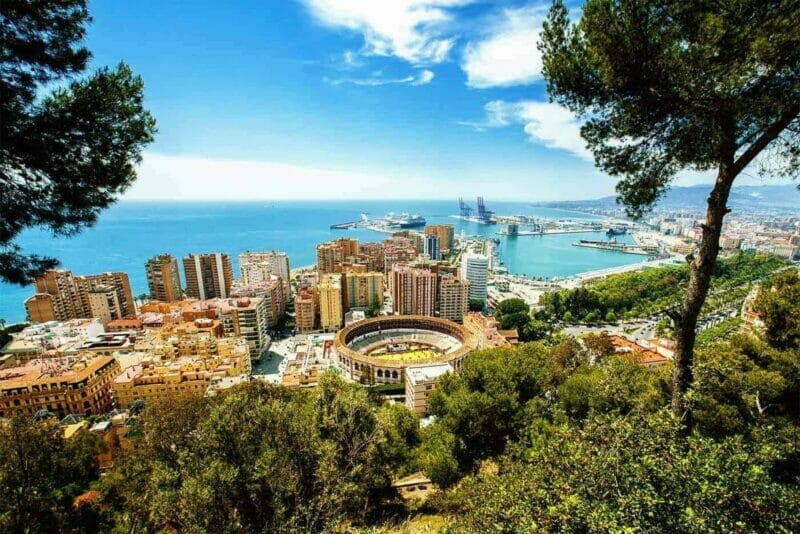
The Costa del Sol is one of Andalucia’s main treasures and attracts many tourists, professional expats, and retirees keen to get their share of sunshine and an exciting Mediterranean lifestyle.
The magnificent coast with numerous beaches attracts people from all over the world to come and live in Malaga
It goes as far as the Costa Tropical of Granada province to the east and southwards towards Gibraltar to the west. All the major resorts, such as Fuengirola, Torremolinos Benalmadena, and Marbella are located here.
This stretch of the Spanish coast has a very international feel, with visitors and residents worldwide. It also makes Malaga very busy.
If you want to live there, be ready for tourists coming non-stop in big crowds.
Large cruise ships docking in the port spit visitors literally in thousands at any one time.
They are eager to explore the city and the food and test the ability of local caterers to provide a constant flow of Tinto de Verano – and they are never let down.
Malaga boasts great infrastructure, great cuisine, and fabulous architecture rooted in Moorish and Roman times.
If you prefer apartments – check out the old town center. There are quite a few refurbished properties there – great apartments with high ceilings and lovely windows.
If you want to live in a quieter area, look at La Malagueta, Limonar, and Cerrado de Calderon.
These are the neighborhoods with typical suburban houses and flats and are popular with expat families.
La Malagueta is one of the firm favorites with many ex-pats for its great schools, peaceful atmosphere, all the amenities on the doorstep, and a beach nearby.
You will find more information about Malaga, its pros and cons, neighborhoods, the cost, and more in our Living In Malaga guide.
8. Marbella
Marbella is all about glamour and glitz; it attracts the rich and the famous worldwide.
It is a fantastic location with vibrant sunny beaches and attractive architecture. It has low crime levels and is beautifully maintained by the local authorities.
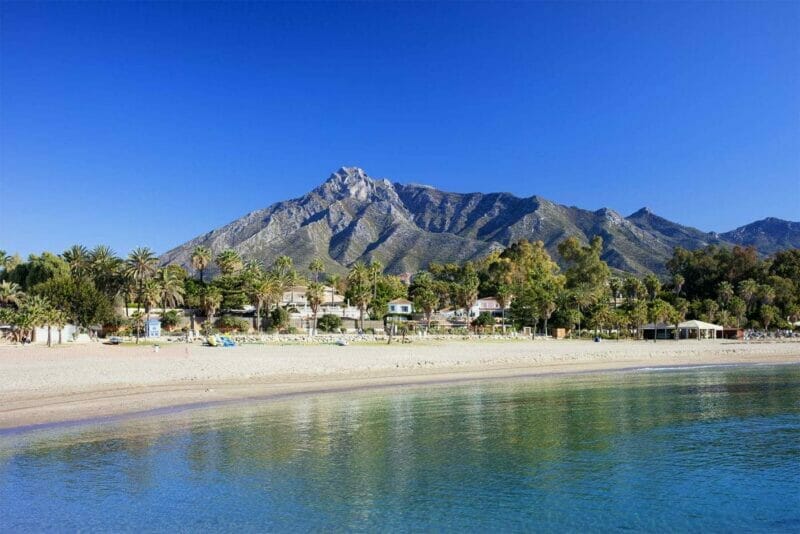
Gastronomically, Marbella is a paradise with every eatery, be it a small café or a Michelin-starred restaurant, serving exceptional food.
Expats with families and kids find everything they need to educate, look after, and keep their young ones entertained.
Those who plan to stay for a long time rarely bother to send their children to international schools as the Spanish schools are generally up to the mark and free.
However, if your stay is going to be short, or you would like your kids to follow an international curriculum, or simply worry that your older ones will be struggling with Spanish, there are excellent international schools in Marbella, including Swans School, Aloha College, Calpe School, and Mayfair Academy.
Retirees, on the other hand, love Marbella for its ease of integration and healthy lifestyle.
There are scores of agencies and businesses catering to the needs of foreign retirees, and hospitals and medical care are adequate.
Once you get to know different locations better, you will find a choice of retirement property available for purchase very satisfying.
There are plenty of locations to choose from in Marbella, the main ones being San Pedro, Puerto Banus, Nueva Andalucia, Golden Mile, Town Centre, and East Marbella.
Almost every district in Marbella enjoys scenic views of the mountains that frame the city on the north; every district has something special to offer, too.
The old town is delightfully lively, full of little quirky shops and galleries.
The Golden Mile offers the best nightlife and entertainment – it is full of prestigious nightclubs and luxury coastal estates.
It also houses the Puerto Banús marina – a spectacular display of extremely expensive yachts. The marina is lined with elegant boutiques and bars.
Puerto Banus, a relatively new development 10 km away from central Marbella, was designed and built in 1970 as a luxury marina and shopping area.
The shops and restaurants in Puerto Banus and the nightlife are exceptional.
If you are looking for truly luxurious surroundings and don’t mind a 20 km drive from Marbella, then look no further than la Zagaleta.
Located at the heart of a fabulous area of the Costa del Sol, only a few miles from Puerto Banús, is a stunning and truly exuberant development – La Zagaleta or “La Zagaleta Country Club”.
This is one of Europe’s most exclusive residential developments, extremely well planned and connected to all the major infrastructure, located in a stunningly beautiful region of the Costa del Sol.
With the Ronda mountains to the North and only a short drive from Marbella, La Zagaleta is a perfect destination for those who want a luxury country lifestyle, well-groomed parks, golf fields, and spacious villas – all of this within a short distance from vibrant urban facilities.
As you see, Marbella offers a wealth of options for different tastes and lifestyle preferences.
It is truly cosmopolitan, with great shopping and places to go out and fantastic leisure opportunities and entertainment events on offer.
9. Sotogrande
In the southernmost part of the coast, the Costa del Sol meets the Costa de la Luz in Cadiz province near Gibraltar. Here, you’ll discover one more exclusive location – the port and residential developments of Sotogrande, the country’s most expensive real estate location.
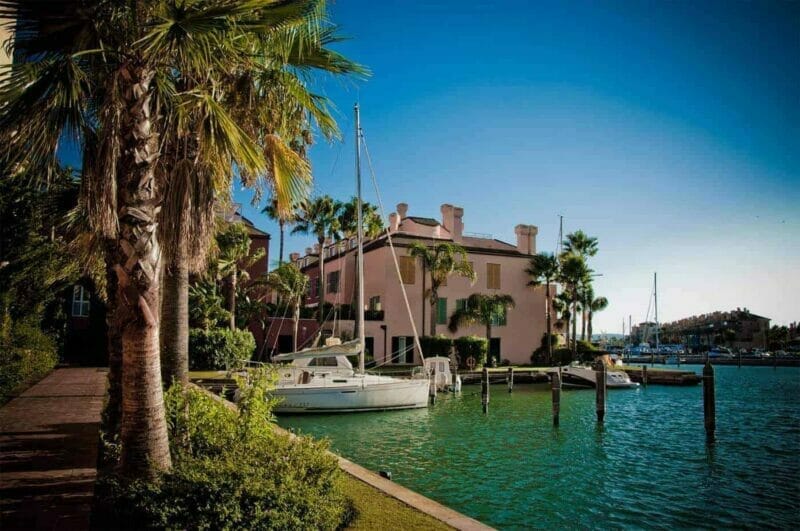
Some of the richest and most powerful families in Spain have summer homes in Sotogrande as well as other rich and famous families from all over the world.
If you love polo, golf, or yachting, – Sotogrande is your destination.
Some of the best golf courses in Spain are located there, as well as Santa Maria Polo Club, and yacht owners can choose a villa with its own jetty.
The pearl of Sotogrande is its renowned Trocadero Sotogrande Restaurant and Beach Club. Here, you can enjoy superb Mediterranean cuisine in the most delightful surroundings of your choice: from sea views to swimming pools to gardens and hammocks to intimate secluded spaces – anything you can imagine is there.
Sotogrande is one of the favorite locations for professional expats who have been offered a job in Gibraltar but want to live further up the coast in Spain.
They commute to Gibraltar either by car or by bus.
The most popular way is to park in La Linea and walk over the border, as there are no queues.
Those who use buses are also dropped off at the border, walkthrough, and get the local Gibraltar bus if their office is too far to walk to.
Some people even use folding bicycles.
Sotogrande is extremely well-connected.
Gibraltar’s airport is just 20 minutes away, and Málaga’s is an hour’s drive. It’s also close to beautiful places such as Ronda and the white villages of Andalucía and has well-regarded international schools and a diverse international community.
10. Estepona
Estepona isn’t so widely celebrated and is quite often overshadowed by its big cousins Malaga, Marbella, and Puerto Banus.
However, if you’re seeking a quieter and cozier lifestyle, a small-town feel with easy access to all major amenities, you should definitely consider Estepona.
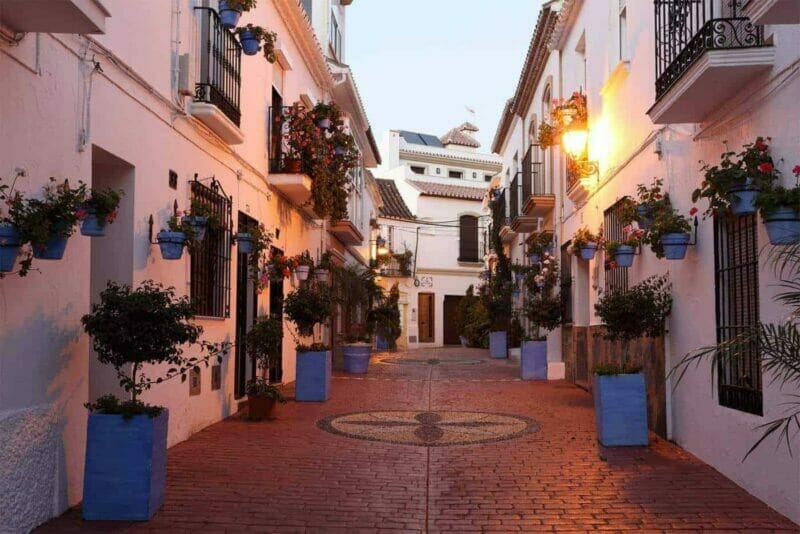
It’s a lovely town full of white-walled houses and buildings, a charming coastal town squeezed between the sea and the mountains.
It is quaint yet lively and joyful.
With its year-round beautiful weather, close proximity to airports, relaxed lifestyle, and stunning cuisine, Estepona is fast becoming one of the most attractive places to buy a property on the Costa del Sol.
There are all the amenities and facilities to serve the expat community: shops, cafes, tapas bars, great beaches, a wonderful marina, eight golf courses, and seven museums.
Estepona, just like Sotogrande, is becoming a location of choice for those expat professionals who have been assigned to work in Gibraltar but don’t want to live there because of the high costs.
So they choose Estepona instead as their family headquarters and commute from Estepona to Gibraltar on a daily basis.
It takes about half an hour to drive from Estepona to the border.
Most people then park and walk over. It’s much easier than getting over the border by car – this can sometimes take hours in both directions.
There’s a car park near the border about a 20-30 minute walk away from central Gibraltar, or you can jump on a local bus.
For residents with families settling in and around Estepona, the area offers an excellent choice of international schools, local state schools, and bilingual nurseries.
Estepona is also a paradise for nature lovers.
Estepona’s beaches, stretching for over 13 miles along the coast, are truly fabulous; two of them are Blue Flag beaches.
Because of its position between the sea and the mountains, Estepona has a microclimate of its own, with over 325 days of sunshine a year.
To learn more about Estepona, its amenities and costs, read our guide, What Life Is Like In Estepona As An Expat.
11. Alicante
Alicante is the capital of the stunning Costa Blanca region.
The Costa Blanca, or the white coast, known for the color of its sandy beaches, stretches from Alicante to Valencia.
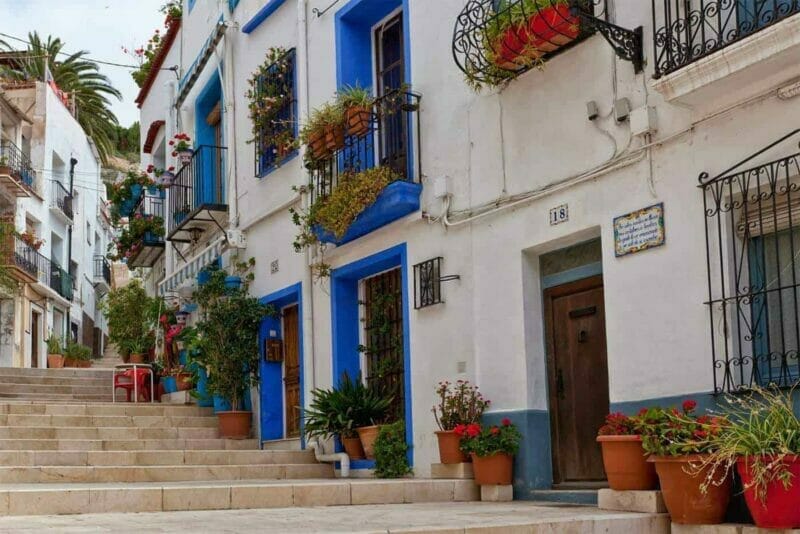
Such beauty doesn’t go unnoticed – the Costa Blanca is one of Europe’s most popular mass tourism destinations.
The coast is framed by a rugged mountainous landscape and sandy beaches, colored with subtropical vegetation, and features a great number of sweet little villages in between its two main cities, Alicante and Benidorm.
Alicante scores high for the weather, natural wonders, relaxed lifestyle, food, and leisure activities – all this comes at a much lower price than the major urban hubs offer.
This combination of comfortable urban life and a relaxed country feel is what makes Alicante so appealing to many expats.
With its green parks dotted all over and delightful promenades, Alicante is irresistibly charming.
There are wonderful beaches and quiet coves to idle away your days, and an exciting nightlife with a great variety of places to go out and enjoy.
The best part is undoubtedly the Esplanade – a palm-treed marble promenade connecting the town and the port.
It’s a beautiful space that truly comes alive when the heat of the day subsides and people gather in the evening to walk and socialize.
Like all Spanish people, local residents know how to throw a proper party!
The famed five days of Bonfires of Saint John make an unforgettable experience if you are visiting. For residents, it’s a big event to look forward to each year.
It is well-connected. The International Airport of Alicante (El Altet) is just a short drive away and it takes about 2 hours to get there from most major European capitals (London, Berlin, Frankfurt, Paris, Milan, Zurich).
The train station offers high-speed connections to major cities across the country.
Lots of facilities for families make the town attractive for expat families.
There are international schools, decent public schools, English-speaking doctors, dentists, and other services.
Anyone who wants to live in Spain in a beautiful coastal city with mild winters and hot summers will definitely find Alicante to be a great location.
If you are into yachting or sailing of any kind and love mountains and miles and miles of white beaches, – then Alicante will be one of the biggest contenders for your perfect retirement destination.
Public transportation is excellent. You can get anywhere relatively quickly, cheaply, and with comfort (all trams are air-conditioned).
A short 15-minute tram trip can also take you out of the city noise and hubbub to the amazing white sand beach of San Juan.
In short, there’s something for everyone in Alicante, which is why so many expats that make up the international community feel completely at home.
Read about Life On The Costa Blanca In The Alicante Province for more information.
Finding the best place to live in Spain – summary
Spanish cultural and geographical diversity makes it such an attractive location for people from all over the world. It also makes it difficult to determine the best place to live in Spain.
If you are in free fall, retiring or semi-retiring to Spain, or even relocating there with your portable business in the suitcase, choosing your location can feel like an impossible task.
Take your time, shortlist the suitable locations for living in Spain, visit the country often, and get to know all those beautiful places, towns, and coastal locations you’ve been reading about. Don’t forget the islands: the Canary Islands and Balearic Islands, with Mallorca being the top destination.
Don’t be in a rush, and don’t be tempted to buy a house in a location you’ve just fallen in love with.
Instead, rent a property for some time, learn about your new region, and get to know the surroundings, the vibe, seasonal changes, and whether it works for you before committing to buying a property there.
Flexibility and patience are great assets for living in Spain – you will need them to adapt and change your lifestyle.
Most of all, enjoy your new life in Spain.
You might find useful:
- Living In Spain Guide – actionable how-to tips on settling down in Spain: from residency to medical care, to taxes, to removals, etc.
- 10 Tips To Make Retiring To Spain An Absolute Success – focus on the most important aspects of your relocation to make sure your move is a success.
- UK Pensions And Tax In Spain – understand what your options and tax liabilities will be in Spain so you can make sure you have all your planning in order before you relocate.
- Planning & Organising Removals To Spain – how to save time and money on organizing removals: your removals options, how long they take and how much they cost, shipping pets, etc.
- Didn’t find what you were looking for or need further advice? Contact us with your questions, and we will do our best to help.
Helpful external links:
- To check air quality and pollution levels in Spanish locations, head to IQAir.com.
- Compare the costs and expenses across Spain on the Numbeo site.

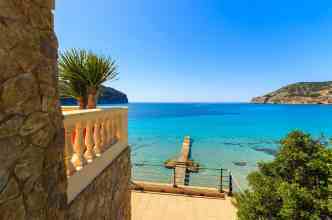
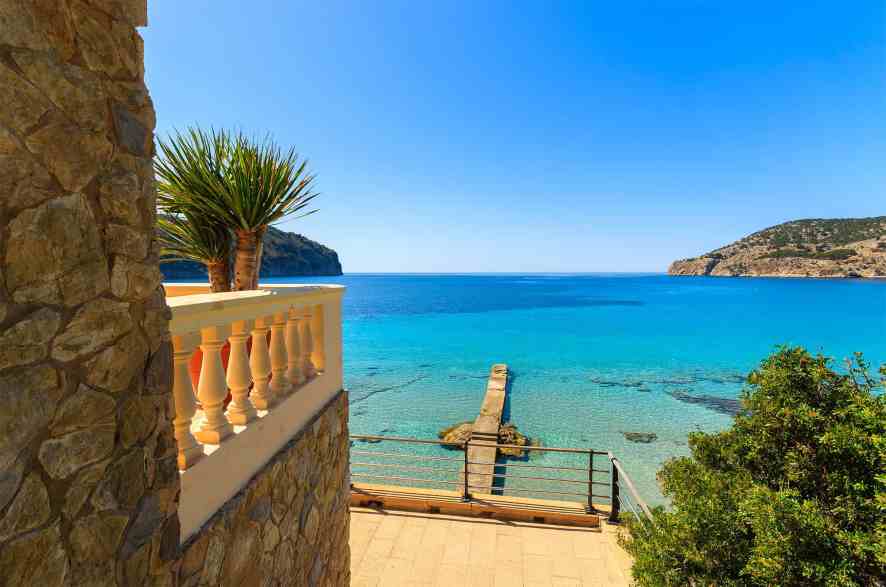
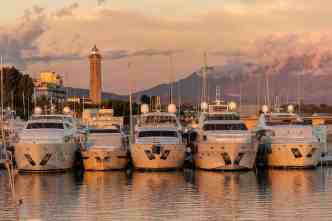
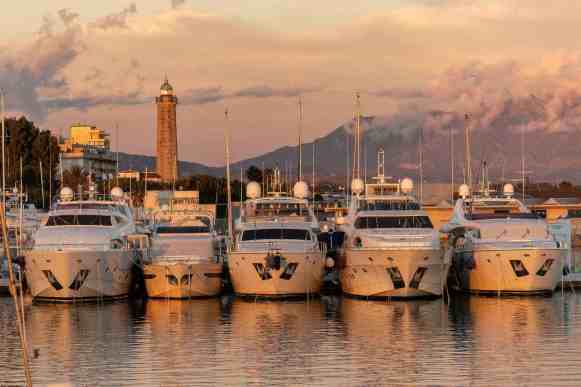
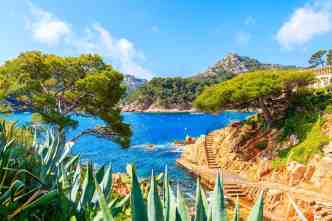
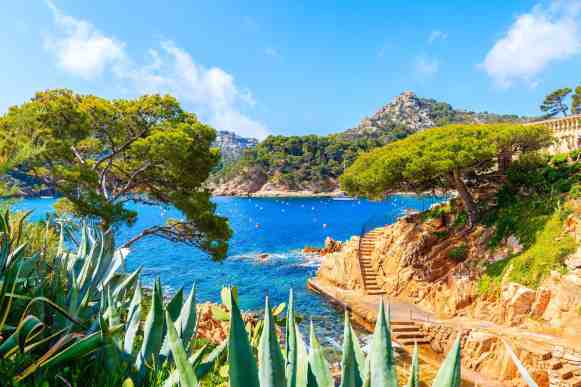
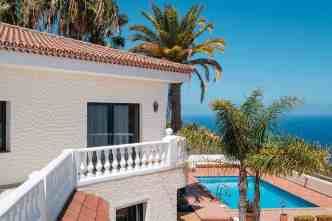
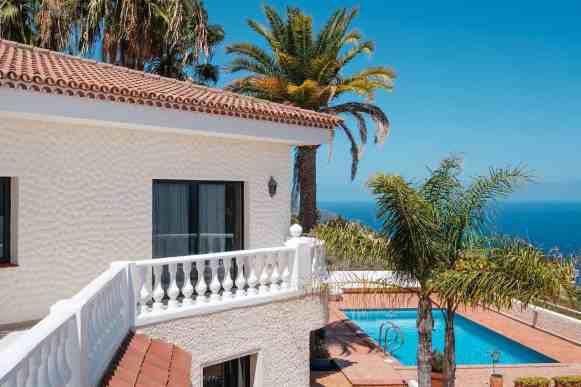
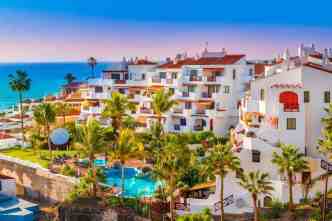
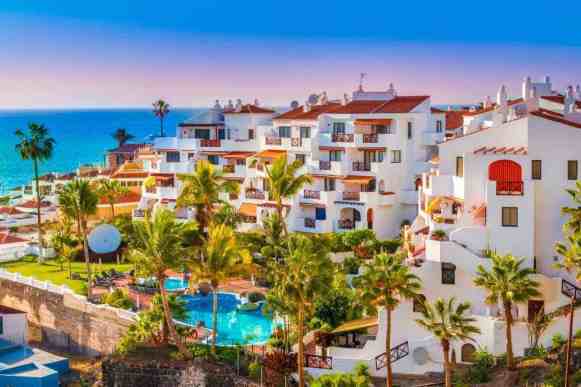
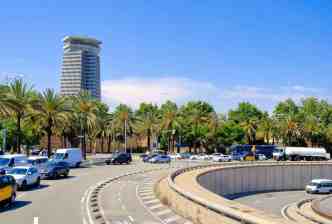



A very interesting article. I am planning to move to Spain soon with my teenage children. We also have 2 dogs. We want to live a maximum of 10 km from the sea and a 20-minute drive to a larger, attractive city. We care about nice weather, good public transport, good Spanish schools and that it would be a place to live permanently and not a tourist resort. Can you recommend any areas?
Hi Katrina, for the best seaside locations, read our Spanish Costas guide: https://expatra.com/guides/spain/the-spanish-costas/. Since you want to avoid international resorts, look at the Costa Calida https://expatra.com/guides/spain/living-in-murcia-and-the-costa-calida/
The most popular areas, such as Andalusia, are, of course, very touristy. But if you want a reasonable balance, the Costa Granada is the least touristy area in Andalucía. Hope this helps. If you need practical advice and assistance, you can always get in touch with our Spain expert Tom Julian for a consultation: https://expatra.com/author/tomjulian/
Hello there!
I’m a 26 year old looking to move to Spain for work.
I have an intermediate grasp of Spanish and would love to hear your feedback on somewhere that provides:
– strong transport links
– International schools at close proximity (for work purposes)
– Easy Airport proximity
– Access to nature/parks
– small town living but near City facilities
– affordable
Thank you in advance 🙂
Hello Eve –
Thank you for reading our article about Spain and contributing to our knowledge base.
Given the fact that you can comfortably communicate in Spanish, you really have your pick of where to be based.
Every region has at least one international airport, and virtually every city is connected via train and bus.
One of the best aspects of Spain is that urban green space is a fundamental part of the landscape.
Thus, based on your criteria, the factors of international schools, small-town living, and affordability are the primary filters.
You state international schools for “work purposes” so I am assuming you intend to work at a school and thus a teacher salary [and I’m going to take for granted that you are aware of what that actually amounts to].
This is important for understanding ‘affordability’ regarding the current rental market in Spain.
But, you don’t specify what type of schools – international colleges or grade schools.
So, as a top 4 cities, I would suggest looking into –
Murcia – https://expatra.com/guides/spain/living-in-murcia-and-the-costa-calida/
Malaga – https://expatra.com/guides/spain/living-in-malaga/
Alicante – https://expatra.com/guides/spain/living-on-the-costa-blanca-in-the-alicante-province/
Valencia – https://expatra.com/guides/spain/living-in-valencia/
I personally have lived in all four and think each has something great to offer, but if I had to choose one to return to, I would go with Malaga.
I hope that helps Eve.
Best of luck!
Julian – Global Talon
Explore, Experience, Engage
Hi,
I currently reside in Prague and make passive income by working as an actor/background extra in TV/Film. Decided to move to Spain this Autumn and I’m looking for a place within where working in the industry would be easiest.
Also, my main job is in the airline industry (based in NYC) and would prefer a place near an international airport and good public transportation.
Would appreciate any advice you can provide.
Thanks in advance.
Hello Jerry –
Thank you for reading our article about Spain and contributing to our knowledge base.
Though not the heyday that it once was, the Spanish Cinema is still full of life in Spain.
Based on your need to satisfy both of your jobs, I would have to suggest that your best options would be either Madrid or Valencia – especially around Alicante [which would be my personal choice].
Around the Alicante area, you will find several ICAA-related academies and professional orgs that you may want to connect with and still be very close to a great and effective international airport. Also, Alicante’s main train and bus station can get you wherever in Spain you want to go.
Here is a link to my colleague’s article on Alicante, you may find it interesting –
https://expatra.com/guides/spain/living-on-the-costa-blanca-in-the-alicante-province/
Hope that helps – break a leg 😜
Julian – Global Talon
Explore, Experience, Engage
Hello there! Thank you for the article! Can you tell some things about Costa Brava? Would be a good place to move & to open a small business ? Thank you very much !
@Lora, Hello
Thank you for reading our article about Spain and contributing to our knowledge base.
The Costa Brava is a very popular tourist spot, but it is also an economic hub of Catalonia.
It’s a perfect location for people who love both French and Spanish cultures and want a bit of the best of both worlds.
If that is the region of Spain you find most attractive, then the Costa Brava is a good place for business as well.
It’s full of options for suppliers and services for just about any type of business, but obviously, anything that can take advantage of the tourism sector would be among the best ideas.
And tourism is also a good idea for deciding upon a location, such as – Rosas, Empuriabrava [home to Europe’s largest residential marina and thus a higher income bracket], or any popular beach destination esp. along the southern stretch of the Costa Brava like Playa de Aro and Lloret de Mar.
The Costa Brava is definitely a good choice for living and business in the northeast region of Spain.
Hope that helps Lora.
Thanks again for leveraging our knowledge base and contributing to it as well.
Julian – Global Talon
Explore, Experience & Engage
Thank you all for the above comments!
Im 35 and planning to spend the majority of my time in Spain from Feb2023. I will be going alone but looking for somewhere with easy access to cafes, restaurants shops etc.
In September I spent 1 month in Estepona where whilst it was on the beachfront and beautiful, I was lost without a car and the area was very quiet, I would not be looking to party etc but would want somewhere where I could immerse with the locals and get to know people. Good food and safe pueblo/town within a short trip to the city
Hi Christine, Estepona is one of the nicest towns along the coast but you also have San Pedro or marbella town center if you are looking for places to live with easy walking distance to amenities. San Pedro is about 15 min drive from Estepona and has a good mix of locals and Expats. It has a Lovely beach front and you can even walk along the beach front to Banus. Have you been anywhere else apart from Estepona ?
Zoe
@christine q,
Public transport is dreadful in the Estepona region and I hate the noisy dual carriageway which runs through the town. You are expected to find a bridge, sparsely scattered along the A7, and then climb steps or walk along a ramp to cross to the other side. Not very appealing at all. The Spanish most love the sound of traffic and people often sit in car parks next to the main road. There aren’t any peaceful parks and too much construction has taken much green space. Landscape is a golf course. It’s soul destroying.
This article was exactly what I was looking for!! We have 2 elementary aged kids and plan to spend February-June next year in Spain. We all want to immerse ourselves and learn conversational standard Spanish. We’d love a place that won’t be too cold, where we can absorb the culture, be close to an international airport, and also a place that our kids will enjoy (ages 7 and 10). Would love your thoughts. Thanks so much!!
Hey Laura,
Thanks for reading our articles and contributing to our knowledge base.
Great choice and how lucky are you kids!
Three cities jump out to me immediately:
Alicante – https://expatra.com/guides/spain/living-on-the-costa-blanca-in-the-alicante-province/
Murcia – https://expatra.com/guides/spain/living-in-murcia-and-the-costa-calida/
Malaga – https://expatra.com/guides/spain/living-in-malaga/
All 3 have international airports, but Murcia’s is very limited. The great news is that Alicante airport is only 45 minutes away, and if need be, a bus goes directly from Murcia City center to the airport terminal.
I personally prefer Alicante Airport over Malaga and use it whenever it is even remotely possible.
For genuine living in real Spanish culture, Murcia is the spot, but you will need conversational Spanish to get by. English is not very common.
Alicante, you can get by with English while you learn some Spanish.
Malaga, English is very commonly spoken, but the locals love when expats try to learn the language and the options to do so are abundant.
All 3 run along the Mediterranean coastline, so the weather is amazing year-round.
Also, all 3 are real cities with a tourist element. So, if you live in the community and interact with the community, you won’t have the touristy vibe happening, but at the same time, it will be available for when you do desire that.
All 3 places are perfect for active and adventurous lifestyles, with Malaga offering to most in that area.
Also, just north of Malaga there is a Costco in Seville and if you’re a member where you are now, you can shop at this one as well. So, that may be important for you since you will be staying for 5 months.
Also, the train runs north from all 3 cities, but not necessarily directly.
I’ve included links to our articles on these 3 cities. I wrote about Murcia and Malaga and Jacob wrote a great piece about the southern coastline of Alicante.
Hope that helps and thanks again Laura for your comment, questions, and contributions.
Julian – Global Talon
Explore, Experience & Engage
What a great info you put an effort to.
We thank you for that.
Thou I couldn’t locate Aljarafe village, outside of Seville. !?!
Will be grateful if you can share an address that I can find.
Thank you again,
Thank you, Adam, for pointing this out. It should be “an Aljarafe village” – any village in the area of Aljarafe close to Bollullos de la Mitación where the British School of Seville is located.
We are thinking of relocating to Spain from the US. Looking for area’s close to beaches, cafe’s, shops, we love to walk so an area where we are able to walk out and explore. Close to trains / transportation. We’d like to be in be close to a diverse / LGBTQ community. We are middle aged so not so much a party town but would love to be in a city center or very close. For the winter months the warmer the better.
Hey Monica,
Thanks for reading our piece and contributing to our knowledge base.
I have to be honest with you, the second I read your comment, Málaga is the first place that came to mind.
It has everything you are asking for, plus more.
I wrote a piece about Málaga that you may find interesting. You can read it here:
https://expatra.com/guides/spain/living-in-malaga/
With that said, there are a few other places that could fit many of your needs; such as Sitges.
Sitges is a great combination of urban and beach (Costa Dorada) and it does have a very vibrant LGBTQ scene as well.
If interested, you can read more about the Costa Dorada in another one of my pieces, here:
https://expatra.com/guides/spain/the-spanish-costas/
However, I do want to let you know that one of the reasons for why Spain is so LGBTQ friendly is because LGBTQ basically translates into partying.
So, I would definitely recommend taking a look at Málaga. You can live in the city center or along the coast on the eastern side of the city (such as SOHO or La Malagueta), and the vibrant LGBTQ district is just a 15-minute drive to the west in Torremolinos.
There are also the suburbs of Málaga to consider as well.
So, you will always be far enough away from chaos, but close enough to enjoy it with ease whenever you wish.
And Málaga is pretty much summer and spring year-round!
Also, you will be fine with only English in Málaga, but in Sitges it could be rough away from the touristy areas.
Bear in mind, that Málaga is a southern tourist mecca, so it does get busy in the summer. And Sitges is essentially the Spanish version of Mykonos during the summer season, if you have ever been there.
So, during the summer, avoiding the tourist crowds may be a bit impossible, but you would be fine the rest of the year.
Thanks again Monica for your comment, questions, and contributions.
Best of luck on your adventure!
Julian – Global Talon
Explore, Experience & Engage
Hello.Where would you recommend to move to if you love : beaches,horse riding,great cafes/restaurants that do Spanish and International cuisine.Not too busy, but has shops and an international feel.Airport nearby/ferries to other European destinations.Generally dog friendly. I am in my 40s.
Hello Christel,
Thanks for reading my article and contributing to our knowledge base.
Your question has many elements to it, but I will try to address them all.
Beaches: Take your pick! Spain has some of the best coastal regions in all of Europe. It really comes down to the region/climate you would prefer. I wrote an article on all of Spain’s Costas which you may find helpful:
https://expatra.com/guides/spain/the-spanish-costas/
Horseback riding: Again, Spain is one of the best places in Europe for this as well. Spanish culture and horsemanship go way back.
Traditional & International cuisine: All the big urban areas offer these options, the to understand is that traditional food differs with the region. For example, the paella is from Valencia and still has the best version of it.
International airports: Madrid, Barcelona, Valencia, Alicante, and Murcia all have very modern and very efficient international airports. I use Alicante the most.
Ferry ports: Pretty much all the coastal cities have ferry ports, however, for connections to Europe, the only port for that is Barcelona, which runs ferry service to/from Italy.
All of the tourist areas have an international feel and presence and don’t worry about your dog, he’ll be welcomed.
As far as being busy, you are sort of out of luck with that during the summer season, as Spain is one of the top 3 tourist destinations.
But, outside of summer, the southern part of Spain would be the least chaotic and really reverts to its real Spanish identity.
Madrid, Barcelona, and Valencia are pretty much busy urban hubs year-round.
I would suggest Malaga as a place you should genuinely look into. I think it has all you are looking for. There are many stables between the city center and the suburb Estepona that offer horseback riding. The beaches are amazing, the food is incredible, and it really only lacks the ferry port to Italy, but it does connect to Africa.
Give my article on Malaga a read:
https://expatra.com/guides/spain/living-in-malaga/
If you speak Spanish, then Murcia may be a great option as well, you can read that article here:
https://expatra.com/guides/spain/living-in-murcia-and-the-costa-calida/
Thanks again Christel for the comment/question and for contributing to our knowledge base.
Hope this was helpful and good luck!
Julian – Global Talon
Explore, Experience, Engage
Hello and thank you for providing these details. My husband and I are considering moving to Spain in a couple of years with our three children. We are African American and prefer to live in a diverse community as well as near a city. We enjoy exploring cities and appreciate a bike ride amongst nature. Are there any cities you recommend? I make note of Alicante, Seville, and Granada. Thanks
Hi Alicia, you have shortlisted very worthy locations. I would add to your list Madrid (the most diverse and tolerant city in Spain) and Barcelona with its huge student population from all over the world.
If you are looking for expats’ favourite, then Malaga might be a good option too.
Good luck with your relocation.
Great article.
We are looking to move to Spain for 6 months next year (Mar-Sep) with 2 young kids (toddler and baby) whilst on maternity leave.
My husband is Chilean, and I have an intermediate grasp of Spanish. We would love to hear your thoughts on somewhere that is
– great for cultural immersion to practice the language (happy to avoid to touristic hotspots)
– small town living but near City facilities
– easy to travel around, in and out
– access to nature. We love mountains, but happy with coastal too.
– affordable
– family friendly and safe
Thank you,
Hello Ashleigh,
Thank you for reading the article and contributing to our knowledge base.
Both Murcia and Malaga would be great fits for your family.
Due to the fact that you will be on maternity leave and have a toddler and a baby, in Malaga, English is more readily available, especially in hospitals and clinics. However, due to your husband being a Spanish-speaking native and you having intermediate Spanish skills, Murcia could be a perfect fit.
So, if you are confident with using Spanish, Murcia would definitely fit the bill.
In Murcia, I would suggest Lorca, it’s a small town but only an hour (by bus) to Murcia city. Train and car would be much faster.
Along the coast, I would suggest Bolnuevo and Mazarrón in the port area in general. Its next to Cartagena which has everything, but not as commercial. Bear in mind, during your months, the coastal area will be saturated with tourists and the cost of living does rise a bit.
I would like to direct you to our Malaga piece, and please return early next week as I have a just finished a new piece about Murcia that will be published. I believe you will find answers to many of your questions in that piece.
If you need any addition info after reading them, please just ask in the comments.
And, congratulations on the newest family member!
Julian
Here is Julian’s guide on Murcia and the Costa Calida https://expatra.com/guides/spain/living-in-murcia-and-the-costa-calida/
Hello Joan and Ken,
Murcia is a nice region.
Murcia city-proper is a little historic city, but the closest access points to the Sea are approximately 45-minutes away.
The most accessible and most famous fishing ports in the region of Murcia are Aguilas [just over an hour to the south-west from the city center] and Cartagena [about 40-minutes south city center].
So, you may want to consider Cartagena as the place to go as it is the larger and far more modern of the two.
Cartagena is also your best option in Murcia for English. It can be very touristy, as the port is used extensively by cruise ships, since the area is full of ancient Roman ruins and other historic sites.
Having said that though, you cannot consider English as a second language there. It will be mostly the younger generation and the touristy spots, so if you plan to live there long term, learning Spanish would really be necessary.
But, the weather is beautiful, the people are hospitable, its full of culture, the nature is amazing, and the food is incredible, esp. if you love seafood.
The Calle Mayor is the primary shopping and eating district, it runs from the city center to the port.
However, keep in mind that Cartagena is a port/fishing town, not a beach town, so there is only 1 real beach.
I hope that helps. FYI, I will be writing a piece in about a month about Malaga. It is possibly the best city in the south of Spain to live/retire, in my opinion.
In any event, Murcia is a nice region, so I would advise more research into Cartagena.
Best of luck, and let me know if there is anything else you would like to know.
Thanks for reading and furthering the conversation.
Julian
We are thinking to relocate to Mercia, we are very active and my husband main hobby is fresh water fishing.
Where is Murcia is the best place to live within in a 30ish mins drive. We are looking for a high amount of English
Community as our Spanish is so limited. I like crafts all interest me. Please help to find the perfect place to retire. Thank you.
Here is Julian’s guide on Murcia and the Costa Calida https://expatra.com/guides/spain/living-in-murcia-and-the-costa-calida/
Great report. Thanks!
Yes ! So true !
I work in La Zagaleta and it is a paradise on earth!
Tell me more. Do they speak English?
“It is a home to the San Fermín Bull festival” – not Valencia; try Pamplona!
I am looking to buy a small home maybe in village close to a city such as Valencia or Alicante